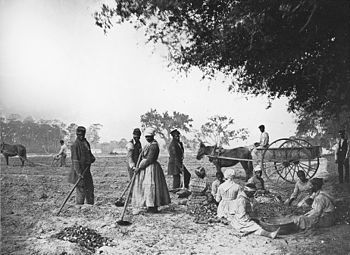 |
| James Hopkinson's Plantation. Planting sweet potatoes. African American men and women hoe and plow the earth while others cut piles of sweet potatoes for planting. One man sits in a horse-drawn cart. (Photo credit: Wikipedia) |
Booker T. Washington was born a slave. In his autobiography, "Up From Slavery," written in 1901 -- just a mere 36 years after the Civil War -- Washington wrote:
"As a rule, not only did the members of my race entertain no feelings of bitterness against the whites before and during the war, but there are many instances of Negroes tenderly caring for their former masters and mistresses who for some reason have become poor and dependent since the war. I know of instances where the former masters of slaves have for years been supplied with money by their former slaves to keep them from suffering. ... One sends him a little coffee or sugar, another a little meat, and so on. Nothing that the colored people possess is too good for the son of 'old Mars' Tom,' who will perhaps never be permitted to suffer while any remain on the place who knew directly or indirectly of 'old Mars' Tom.'...
"From some things that I have said one may get the idea that some of the slaves did not want freedom. This is not true. I have never seen one who did not want to be free, or one who would return to slavery.
"I pity from the bottom of my heart any nation or body of people that is so unfortunate as to get entangled in the net of slavery. I have long since ceased to cherish any spirit of bitterness against the Southern white people on account of the enslavement of my race. No one section of our country was wholly responsible for its introduction, and, besides, it was recognized and protected for years by the General Government. Having once got its tentacles fastened on to the economic and social life of the Republic, it was no easy matter for the country to relieve itself of the institution. Then, when we rid ourselves of prejudice, or racial feeling, and look facts in the face, we must acknowledge that, notwithstanding the cruelty and moral wrong of slavery, the ten million Negroes inhabiting this country, who themselves or whose ancestors went through the school of American slavery, are in a stronger and more hopeful condition, materially, intellectually, morally, and religiously, than is true of an equal number of black people in any other portion of the globe.
Read the rest here:
'Hands Up, Don't Shoot' Activists -- and Historical Ignorance - Larry Elder - Page 2


No comments:
Post a Comment